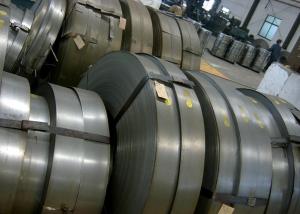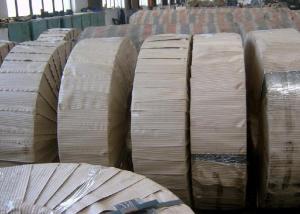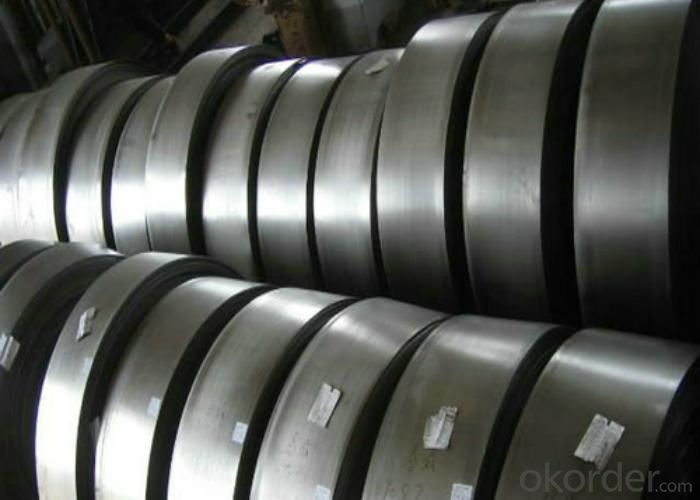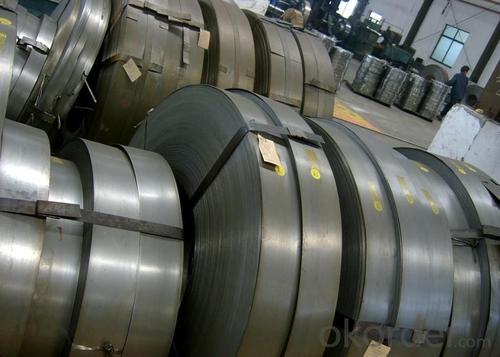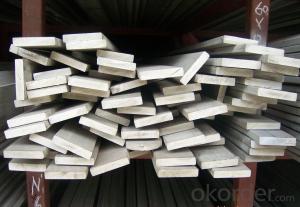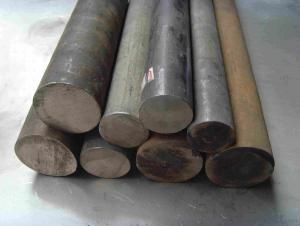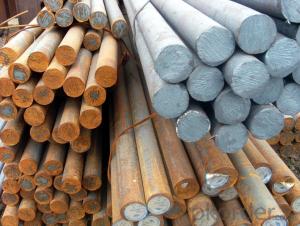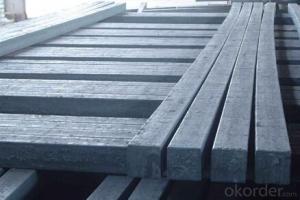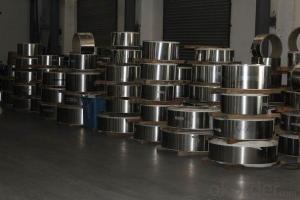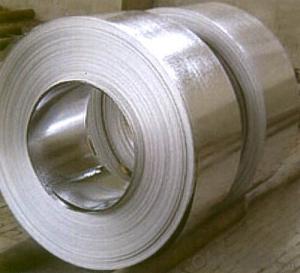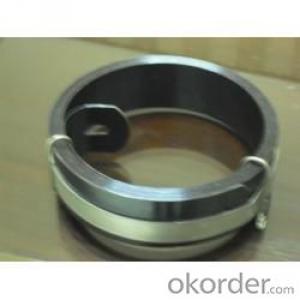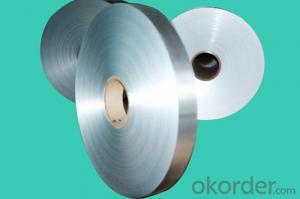Spring Steel Strip
- Loading Port:
- China Main Port
- Payment Terms:
- TT or LC
- Min Order Qty:
- 50MT m.t.
- Supply Capability:
- 600000TONS/YEAR m.t./month
OKorder Service Pledge
OKorder Financial Service
You Might Also Like
Spring Steel:
Spring steel is divided into two types, one is alloy spring steel, and other one is carbon spring steel.
Alloy spring steel is a type that is used for manufacturing springs and other elastic parts. Spring steel should have high elastic limit and ratio of yield strength and tensile strength to make sure that the springs obtain enough power of elastic deformation and can bear much load.
Types of alloy spring steel: Si-Mn spring steel, Si-Cr spring steel, Cr-Mn Spring steel, Cr-V spring steel and so on.
Specification of Spring Steel Strip
-Material: 50CrVA
-Standard: GB/T 1222-2007
-Type: Spring Steel
Corresponding Steel Grade for Reference:
CHN, GB | JPN, JIS | GER, DIN |
50CrVA | SUP10 | 50CrV4 |
GBR, BS | FRA,FN | |
735A51 | 50CV4 |
Chemical Composition:
C | Si | Mn |
0.46~0.54 | 0.17~0.37 | 0.50~0.80 |
S | P | Cr |
≤0.030 | ≤0.030 | 0.80~1.10 |
Ni | Cu | V |
≤0.35 | ≤0.25 | 0.10~0.20 |
Mechanical Properties:
-Tensile Strength σb (MPa): ≥1274 (130)
-Yield Strength σs (MPa): ≥1127 (115)
-Elongation δ5 (%):≥10
-Percentage reduction of area: ψ (%): ≥40
-Hardness:
1, Hot rolled, ≤321HB
2, Cold drawn + Heat treatment: ≤321HB
-Norm of heat treatment:
1, Quenching: 850℃±20℃.
2, Cooled by oil.
3, Tempering: 500℃±50℃.
Usage/Applications of Spring Steel Strip
-Mechanical Properties are good. 50CrVA have high hardenability. The element V reduces thermal sensitivity and improves the strength and toughness. The fatigue strength and yield point are high but the weld ability is bad.
-50CrVA is a nice material of spring. Usually it’s used as valve spring, piston spring and secure valve spring with big section that can bear much load. The working temperature is below 300℃
Packaging & Delivery of Spring Steel Strip:
-Packing Detail: The products will be well packed.
-Marks:
1, Tag marks. To show customers the specifications of products, company name and logo and other information required by customers.
2, Color marks. It’s easy for customers to distinguish them from other products at destination port.
-Delivery Detail: 30~45 working days after receive buyer’s T.T. or L/C.
Payment:
-Theoretical weight/Actual weight.
-FOB, CFR or CIF.
-Terms of payment: T.T. or L/C at sight.
Photos of Spring Steel Strip:
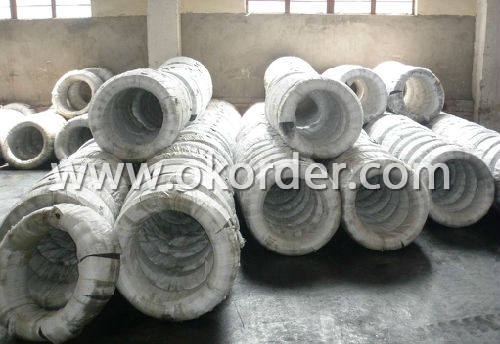
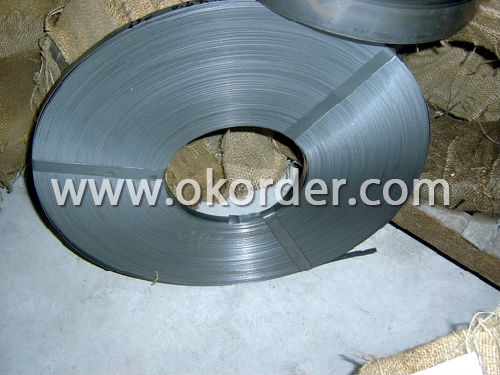
- Q: How does special steel contribute to improving product safety in high-risk industries?
- Special steel plays a crucial role in enhancing product safety in high-risk industries due to its unique properties. Its exceptional strength, durability, and resistance to corrosion and wear make it ideal for manufacturing critical components in sectors like aerospace, automotive, and energy. By using special steel, manufacturers can ensure that their products can withstand extreme conditions, reducing the risk of failure or malfunction. This, in turn, enhances the safety of the end-users and prevents potential accidents or disasters in high-risk industries.
- Q: What are the specific requirements for special steel used in the marine shafting industry?
- The specific requirements for special steel used in the marine shafting industry are as follows: 1. Corrosion Resistance: Special steel used in marine shafting must have high resistance to corrosion due to the harsh conditions encountered in marine environments. It should be able to withstand constant exposure to saltwater, humidity, and other corrosive elements without deterioration. 2. Strength and Toughness: Marine shafting steel should possess high strength and toughness to withstand the heavy loads and vibrations experienced in marine operations. It should be able to withstand the continuous stress and dynamic loads without failure or deformation. 3. Fatigue Resistance: The steel used in marine shafting should have excellent fatigue resistance to withstand the cyclical loading experienced during operation. It should be able to endure millions of load cycles without developing cracks or fractures. 4. Dimensional Stability: Special steel used in marine shafting must exhibit dimensional stability to ensure precise alignment and fit within the machinery. It should have minimal dimensional changes under varying temperature and humidity conditions to maintain the integrity of the shaft system. 5. Machinability: It is essential for the steel used in marine shafting to be easily machinable to create complex shapes, such as propeller shafts and couplings. This allows for efficient manufacturing and maintenance of the shafting components. 6. Non-Magnetic Properties: Special steel used in marine shafting must possess low magnetic permeability to avoid interference with sensitive navigation and communication equipment. Non-magnetic properties minimize the risk of compass errors and electromagnetic interference. 7. Certification and Compliance: The steel used in marine shafting should meet specific industry standards and certifications, such as those set by classification societies like the American Bureau of Shipping (ABS) or the International Association of Classification Societies (IACS). These certifications ensure the steel's quality, performance, and adherence to safety regulations. Meeting these specific requirements ensures that the special steel used in marine shafting provides reliable performance, durability, and safety in marine applications.
- Q: How is high-strength stainless steel used in the production of structural components?
- High-strength stainless steel is commonly utilized in the production of structural components due to its remarkable properties. Its high tensile strength, corrosion resistance, and durability make it ideal for constructing critical load-bearing structures such as bridges, buildings, and infrastructure. Additionally, the stainless steel's ability to withstand extreme environmental conditions and its aesthetic appeal further enhance its usage in various structural applications.
- Q: What are the applications of special steel in the nuclear industry?
- Special steel is extensively used in the nuclear industry due to its exceptional properties. It is primarily employed in the construction of reactor vessels, containment structures, and fuel storage systems. Its high strength, corrosion resistance, and ability to withstand extreme temperatures make it an ideal material for these critical components. Additionally, special steel is also utilized in the production of nuclear fuel rods, shielding materials, and various other components that require excellent mechanical properties and resistance to radiation damage.
- Q: How does special steel contribute to the aerospace safety?
- Special steel contributes to aerospace safety in several ways. Firstly, special steel is used in the construction of aircraft components such as landing gear, engine parts, and structural supports. These components need to withstand extreme stress, high temperatures, and corrosive environments, and special steel provides the necessary strength, durability, and resistance to ensure the safety and reliability of the aircraft. Secondly, special steel is utilized in the manufacturing of aerospace tools and equipment. These tools are essential for maintenance, repairs, and inspections of aircraft systems. The high strength and toughness of special steel ensure that these tools can withstand heavy use, enabling efficient and accurate maintenance procedures, ultimately contributing to the overall safety of aerospace operations. Furthermore, special steel is also used in the production of safety-critical fasteners and connectors in aerospace applications. These fasteners play a crucial role in holding aircraft components together, and their reliability is paramount for the safe operation of the aircraft. Special steel's excellent mechanical properties, including high tensile strength and resistance to fatigue, ensure the integrity and security of these fasteners, reducing the risk of component failure and enhancing aerospace safety. Overall, the use of special steel in aerospace applications significantly contributes to safety by providing the necessary strength, durability, and reliability required in critical aircraft components, tools, and fasteners.
- Q: Is special steel suitable for electrical and electronic applications?
- Yes, special steel can be suitable for electrical and electronic applications. Special steel refers to steel alloys that have been specifically designed to possess certain properties or characteristics that make them suitable for particular applications. In the case of electrical and electronic applications, special steel can offer various advantages. One of the key requirements for electrical and electronic applications is high electrical conductivity. While steel is not typically known for its electrical conductivity, certain special steel alloys can be engineered to have improved electrical conductivity. For example, stainless steel can be alloyed with elements such as nickel or copper to enhance its electrical conductivity, making it suitable for applications where electrical current needs to flow efficiently. Another important factor for electrical and electronic applications is magnetic properties. Some special steel alloys exhibit excellent magnetic properties, making them ideal for applications such as transformers, motors, and generators. These alloys can possess high magnetic permeability, low coercivity, and low hysteresis losses, which are crucial for efficient energy transfer and minimal power loss. Furthermore, special steel can also provide excellent corrosion resistance, which is essential in electrical and electronic equipment that may be exposed to moisture or harsh environments. Stainless steel, for instance, is highly resistant to corrosion, ensuring the longevity and reliability of the equipment. In summary, special steel can be suitable for electrical and electronic applications when it possesses the necessary electrical conductivity, magnetic properties, and corrosion resistance. By choosing the appropriate special steel alloy, manufacturers can ensure the performance, durability, and reliability of electrical and electronic equipment.
- Q: Can special steel be used in the cement manufacturing industry?
- Yes, special steel can be used in the cement manufacturing industry. Special steel is often used for various applications in the cement industry, such as in the construction of kilns, crushers, mills, and other heavy-duty equipment. Its high strength, corrosion resistance, and durability make it suitable for withstanding the harsh conditions and abrasive materials involved in cement production.
- Q: How does special steel contribute to reducing product costs?
- Special steel contributes to reducing product costs in several ways. Firstly, special steel has a higher strength-to-weight ratio, meaning that less material is required to achieve the same strength and performance as traditional steel. This reduces the overall amount of steel needed for manufacturing, leading to cost savings. Additionally, special steel is known for its durability and resistance to wear, corrosion, and heat, thus reducing the need for frequent repairs or replacements. This prolongs the lifespan of products, resulting in reduced maintenance and replacement costs. Furthermore, special steel often allows for more precise and efficient manufacturing processes, such as forging or machining, which can lower production costs by minimizing waste and improving productivity. Overall, the use of special steel in product manufacturing helps to optimize material usage, enhance durability, and streamline production, consequently reducing product costs.
- Q: Can special steel be used in the medical industry?
- Yes, special steel can be used in the medical industry. It is commonly employed in the production of surgical instruments, medical implants, and equipment due to its high strength, corrosion resistance, and biocompatibility. Special steel alloys, such as stainless steel and titanium alloys, are extensively utilized in various medical applications to ensure patient safety and enhance the effectiveness of medical procedures.
- Q: What are the properties of corrosion-resistant stainless tool steel?
- Corrosion-resistant stainless tool steel possesses a number of key properties. Firstly, it exhibits excellent resistance to corrosion, making it highly durable and suitable for use in corrosive environments. It also has high strength and hardness, ensuring its effectiveness as a tool material. Additionally, this type of steel offers good wear resistance, enabling it to withstand repeated use without significant deterioration. Moreover, it retains its sharpness and cutting edge for extended periods, making it an ideal choice for various cutting and machining applications. Overall, the properties of corrosion-resistant stainless tool steel make it a reliable and long-lasting option for demanding industrial and manufacturing settings.
1. Manufacturer Overview
| Location | Jiangsu, China |
| Year Established | 1990 |
| Annual Output Value | Above US$ 20 Million |
| Main Markets | Mid East; Eastern Europe; North America |
| Company Certifications |
2. Manufacturer Certificates
| a) Certification Name | |
| Range | |
| Reference | |
| Validity Period |
3. Manufacturer Capability
| a) Trade Capacity | |
| Nearest Port | Shanghai |
| Export Percentage | 20% - 30% |
| No.of Employees in Trade Department | 21-50 People |
| Language Spoken: | English; Chinese |
| b) Factory Information | |
| Factory Size: | Above 100,000 square meters |
| No. of Production Lines | 1 |
| Contract Manufacturing | OEM Service Offered; |
| Product Price Range | High; Average |
Send your message to us
Spring Steel Strip
- Loading Port:
- China Main Port
- Payment Terms:
- TT or LC
- Min Order Qty:
- 50MT m.t.
- Supply Capability:
- 600000TONS/YEAR m.t./month
OKorder Service Pledge
OKorder Financial Service
Similar products
Hot products
Hot Searches
Related keywords
